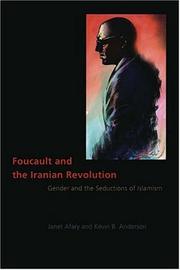| Listing 1 - 3 of 3 |
Sort by
|
Book
ISBN: 986350114X 3847004972 3847104977 3737004978 Year: 2015 Publisher: National Taiwan University Press, Vandenhoeck & Ruprecht V&R Unipress
Abstract | Keywords | Export | Availability | Bookmark
 Loading...
Loading...Choose an application
- Reference Manager
- EndNote
- RefWorks (Direct export to RefWorks)
The book presents Chinese historical thinking by four articles. It is covered the ancient origin and the development to modernity and is commented by seven international experts. Presentation and comments find "second thought" by three other international scholars, and at the end the whole discussion find an answer by the authors of the first presentations. The complex structure of argumentation documents not only various ideas and interpretations of Chinese historical thinking, but represent the possibilities and problems of intercultural comparison at the same time.
Historiography --- History --- Cross-cultural studies --- Historical criticism --- Authorship --- Criticism --- chinese --- intellectual history --- theory of history --- humanism --- China --- Episteme --- Power-knowledge --- Western culture --- Western world

ISBN: 1282678930 9786612678936 0226007871 9780226007878 9780226007854 0226007855 9780226007861 0226007863 0226007855 0226007863 9781282678934 6612678933 Year: 2005 Publisher: Chicago : University of Chicago Press,
Abstract | Keywords | Export | Availability | Bookmark
 Loading...
Loading...Choose an application
- Reference Manager
- EndNote
- RefWorks (Direct export to RefWorks)
In 1978, as the protests against the Shah of Iran reached their zenith, philosopher Michel Foucault was working as a special correspondent for Corriere della Sera and le Nouvel Observateur. During his little-known stint as a journalist, Foucault traveled to Iran, met with leaders like Ayatollah Khomeini, and wrote a series of articles on the revolution. Foucault and the Iranian Revolution is the first book-length analysis of these essays on Iran, the majority of which have never before appeared in English. Accompanying the analysis are annotated translations of the Iran writings in their entirety and the at times blistering responses from such contemporaneous critics as Middle East scholar Maxime Rodinson as well as comments on the revolution by feminist philosopher Simone de Beauvoir. In this important and controversial account, Janet Afary and Kevin B. Anderson illuminate Foucault's support of the Islamist movement. They also show how Foucault's experiences in Iran contributed to a turning point in his thought, influencing his ideas on the Enlightenment, homosexuality, and his search for political spirituality. Foucault and the Iranian Revolution informs current discussion on the divisions that have reemerged among Western intellectuals over the response to radical Islamism after September 11. Foucault's provocative writings are thus essential for understanding the history and the future of the West's relationship with Iran and, more generally, to political Islam. In their examination of these journalistic pieces, Afary and Anderson offer a surprising glimpse into the mind of a celebrated thinker.
History. --- Philosophy. --- Foucault, Michel, --- Political and social views. --- Iran --- History --- iran, iranian revolution, gender, islam, islamism, muslim, religious, religion, history, womens studies, political science, sociology, michel foucault, corriere della sera, le nouvel observateu, journalism, journalist, translated works, translation, middle east, simone de beauvoir, philosophy, enlightenment, homosexuality, sexuality, sex, social thought, historian of ideas, literary criticism, power, knowledge, control, societal institutions.
Book
ISBN: 1280491752 9786613586988 0226744272 9780226744278 0226744256 9780226744254 9781280491757 6613586986 Year: 2012 Publisher: Chicago : University of Chicago Press,
Abstract | Keywords | Export | Availability | Bookmark
 Loading...
Loading...Choose an application
- Reference Manager
- EndNote
- RefWorks (Direct export to RefWorks)
The simplest purpose of a map is a rational one: to educate, to solve a problem, to point someone in the right direction. Maps shape and communicate information, for the sake of improved orientation. But maps exist for states as well as individuals, and they need to be interpreted as expressions of power and knowledge, as Steven Seegel makes clear in his impressive and important new book. Mapping Europe's Borderlands takes the familiar problems of state and nation building in eastern Europe and presents them through an entirely new prism, that of cartography and cartographers. Drawing from sources in eleven languages, including military, historical-pedagogical, and ethnographic maps, as well as geographic texts and related cartographic literature, Seegel explores the role of maps and mapmakers in the East Central European borderlands from the Enlightenment to the Treaty of Versailles. For example, Seegel explains how Russia used cartography in the aftermath of the Napoleonic Wars and, later, formed its geography society as a cover for gathering intelligence. He also explains the importance of maps to the formation of identities and institutions in Poland, Ukraine, and Lithuania, as well as in Russia. Seegel concludes with a consideration of the impact of cartographers' regional and socioeconomic backgrounds, educations, families, career options, and available language choices.
Cartography --- Cartography, Primitive --- Chartography --- Map-making --- Mapmaking --- Mapping (Cartography) --- Mathematical geography --- Surveying --- Map projection --- Maps --- Political aspects --- Russia --- Europe, Eastern --- East Europe --- Eastern Europe --- Russie --- Rossīi︠a︡ --- Rossīĭskai︠a︡ Imperīi︠a︡ --- Russia (Provisional government, 1917) --- Russia (Vremennoe pravitelʹstvo, 1917) --- Russland --- Ṛusastan --- Russia (Tymchasovyĭ uri︠a︡d, 1917) --- Russian Empire --- Rosja --- Russian S.F.S.R. --- Russia (Territory under White armies, 1918-1920) --- Relations --- europe, european, borderlands, borders, russian, russia, cartography, cartographer, empire, history, historical context, map, mapping, maps, communication, orientation, power, knowledge, state structures, nation building, national constructions, military, ethnography, napoleonic wars, geography, geographical, intelligence, politics, political, poland, ukraine, lithuania, imperialism.
| Listing 1 - 3 of 3 |
Sort by
|

 Search
Search Feedback
Feedback About
About Help
Help News
News